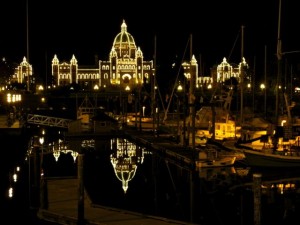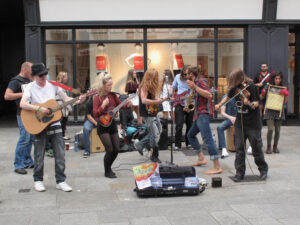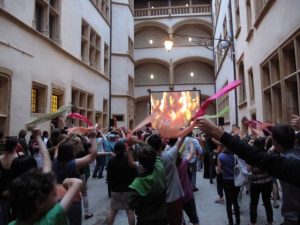Education
To David Eby: These Conversations Must Continue
I was invited on Tuesday morning on to do a CBC Radio studio interview. The invitation was extended because of an email I had sent objecting to the framing of the reaction to Ms. Robinson’s hateful rhetoric as the Muslim community’s issue with her remarks.
I had also published a blog post demanding Ms. Robinson’s resignation, which I believe was another reason the show asked me to appear. Once the news broke that Ms. Robinson had resigned from cabinet, CBC Radio uninvited me. I was told the show’s producers had decided to pivot to another angle.
I’m not going to question the merit of the show’s decision although I was disappointed to lose the opportunity to contribute to a broader public conversation.
Since I was denied the opportunity to share my thoughts on air, I would like to take the time to share a few of my thoughts with you here.
There are three points I’d like to bring to your attention:
1. Ms. Robinson is out of cabinet, but it took a significant amount of community action, a lot of protest, and a general sense of alarm for you, David Eby, to act. It took too long.
What the delay indicates to me, is that there’s a lot of work that you need to do on your own education regarding Palestinian history, the grave injustices that have marked the last 75 years of occupation, and the terrible human cost that we are witnessing every moment of every day.
Ms. Robinson’s resignation, this one outcome, cannot be seen as an ending. It’s just the start of a process in rediscovering empathy, enhancing understanding, and recognizing the value of Palestinian lives, past, present, and future.
2. Ms. Robinson has held the portfolio as Minister of Post-Secondary Education and Future Skills for a while now. Given that her remarks have now exposed her ideological biases, it’s essential for you to investigate the decisions she has made while in that position to ensure that racism and Islamophobia did not play a part in any policy or operational decision that she initiated, made, and implemented.
3. The issue of what is happening in Palestine, both in Gaza and throughout the West Bank, is greater than whether Ms. Robinson has left cabinet. As such, these conversations must continue, and the dialogue can’t just be about pivoting to discuss the fact that Ms. Robinson is no longer a Minister and what that means for you, your government, and your re-election prospects.

BC Legislature, Victoria, BC
Oh, and one more thing before I go.
Those attempting to excuse Ms. Robinson’s remarks as a mistake, or those attacking the individuals demanding her resignation, are wrong. Ms. Robinson’s remarks were not a mistake, and she is not the subject of a vendetta.
People reacted to the evidence of her ingrained beliefs, a revelation to some and for those who have been following the breadcrumbs on her social media trail, a confirmation of a deeply unsettling behaviour pattern.
As I drove to work on Tuesday, anticipating that the invitation I had received earlier that morning would be withdrawn if your afternoon announcement included the news of Ms. Robinson’s resignation, I listened to the noon show on CBC.
The host read an email from a listener who explained her contention that Ms. Robinson did not need to resign by writing that all humans are equal.
That’s precisely the point. All humans are equal and as such deserve the rights and dignities afforded to people such as Ms. Robinson, the email writer herself, and you. Palestinians are humans, too, and nothing is more important at this time then advocating for their right to live in peace and to act when others treat them as disposable, erase them from history, and deny the truth of their existence.
To Selina Robinson: Resign Now
How dare you Selina Robinson!
How dare you take one part of history to erase another!
Do you know how clearly you’ve demonstrated your own ignorance by spouting the hateful rhetoric that Palestine was “a crappy piece of land with nothing on it”?
How dare you annihilate the memory, lives, and legacies of “several hundred thousand people” with a shrug of your shoulders as if they were no more than a few motes of dust to brush off the sleeve of your jacket!
How dare you assert that the land of Palestine was there for colonial powers to offer up to others as a plum reward! As if it were their right to give away land they had forcibly occupied. To treat the land as a token that they could forfeit in a high stakes’ poker game.
Do you even know that Zionist leaders considered other parts of the world before settling on Palestine as the one that was theirs to seize as a homeland?
How dare you deny the history and experience of people such as my grandfather and grandmother! They had productive lives in Haifa until 1948 when Israel’s expansionist march through and over people’s existence forced them to flee to Lebanon! My grandmother narrowly escaped a sniper’s bullet and my grandfather had to give up everything, leaving behind all he had built up through his professional career as a civil engineer.
My grandparents lost everything, and they were among the fortunate who had a place to go. They could return to the Lebanese village they were born in, unlike the many who were forced to live in refugee camps, left stateless, left to dream of the homes that were once theirs and denied the right to return to the homes now occupied by settlers who displaced them.
How dare you imply that my grandparents’ lives were nothing! How dare you deny the reality of all other Palestinian lives, of people who lived in Palestine with family trees rooted in the fertile soil that extended back not decades or years, but centuries!
How dare you deny a culture of a people, a history of a population, the lives of mothers, fathers, sons, daughters, children, aunts, uncles, cousins, grandmothers, grandfathers, friends, relatives and loved ones who shared and continue to share traditions, customs, music, art, poetry, craft, food, and who nourished the lands they tilled and harvested!
How dare you deny the productive labour that created a land that was given away because it was desirable and wanted and envied!
How dare you mythologize the moral superiority and inherent worth of one group of people to rationalize the deaths of over 25,000 souls, injuries to over 65,000 human beings, and the catastrophic destruction of hospitals, homes, playgrounds, schools, and universities, such places of learning as you are responsible for here!
How dare you legitimize the trauma that will mark generations to come! How dare you support undermining the rule of law, ignoring the International Court of Justice, and rendering international order virtually meaningless!
How dare you claim the authority to sit as a representative of the people in the BC Legislature, let alone as Minister of Post-Secondary Education and Future Skills, when your comments today displayed your own lack of education, your tenuous understanding of the facts, your ideological bias, your indisputable racism, and your utter lack of humanity!
How dare you!
Resign.
Now.
Reema Faris
cc. David Eby
Elevate Humanity: Support The Arts!
“Squeeee!”
That was my reaction when Julie Nesrallah, the host of Tempo on CBC Radio, said she was about to play Rimsky-Korsakov’s “Scheherazade”.
Scheherazade is one of my favourite pieces of classical music. When it plays, I soar. I am lifted out of myself to float along currents of enchantment.
When I’m driving, as is often the case when I listen to Tempo, this is problematic. My foot tends to press down on the gas pedal the more immersed I become in the music!
This transcendence, this plug-in to bliss, emphasizes the power of art to shape, teach, transform, heal, and comfort. These attributes are what we need more than ever as we all struggle to grapple with the consequences of the global pandemic.

Galway Street Club, Dublin, Ireland, 2016
Our focus as individuals, families, and communities is on surviving. The focus of governments is on managing health systems and restoring economies. However, to ensure the well-being of society and the well-being of each of us, we need to support creative expression. We need to ensure that the arts thrive.
Unfortunately, arts and culture seldom register as a voting issue during election campaigns, such as the one currently underway in British Columbia. When cast alongside health, housing, and jobs, arts and culture drop down the list of priorities as seemingly, relatively trivial.
I understand why that happens and yet I feel the tendency to do so is misguided. Embedding art in all that we do enriches our experiences, enhances our daily lives, and elevates our humanity. As such, it’s critical that we push our political parties to include support for the arts in their platforms and our elected officials to invest in the arts, especially to facilitate the inclusion of the arts in education, in schools and in the curriculum.
To win the argument for the importance of the arts, professional performance arts organizations often deploy and rely on economic arguments to secure sponsorships and donations. It is true that arts organizations function as economic engines. They employ a wide array of people and generate spending in a number of business sectors. As such, this is an important argument to make especially in a world that justifies investments by returns in dollars and cents. In our current times though the pandemic mitigates the effectiveness of such arguments. We need to emphasize, as we always should do, that investing in the arts is about more than the bottom line of tangible, monetary effects.
It is important to note that arguing for government support of the arts is not the same as advocating for state-sponsored culture. The latter is about nourishing the arts and the latter is about promulgating propaganda. That is why support of the arts should not be contingent on government funding alone. The arts will only survive with individual and community support. We each carry a measure of personal responsibility to ensure that artists and arts organizations have the space, time, and resources to flourish and create.
I also believe that the definition of what constitutes art must be inclusive, expansive, and generous. It is not about creating hierarchical preferences for one art form or the other or privileging the art of certain groups and a few voices. For example, people tend to label opera as elitist and yet opera, fundamentally, is about the human voice and the power of the voice does not depend on costumes, sets, and large venues. Some of the most profound experiences I have had with opera have been in intimate gatherings with no staging to distract from the singer’s voice.
Opera is not an elite art form. It is typically available to only a few because professional opera productions are expensive to stage. That is why the survival of opera as an art form in its professional incarnation depends on government, corporate, and individual support. More importantly, it is crucial for opera companies to invite audiences in with programmes that enhance affordability and to venture out to meet audiences with community-based initiatives.
Support for the arts is about elevating horizons and expanding visions. Art in all its forms should never be a privilege which only a few enjoy and it should never be seen as a talent which only a few can exercise. Creative expression is in all of us and it is for all of us. It is a bridge to building community and understanding. It is a celebration of diversity. It is a path to better.
Art is what makes our spirits soar and our hearts sing.
It makes us more than.
Support the arts in these bleak times. Financially if and when you are able to, with your time and attention if you cannot, because that song, that book, that drawing, that moment of creativity captured in whichever art form you enjoy is a spark of hope.
Rafting Life’s River of Regrets and Resolutions
“Non! Rien de rien … Non, Je ne regrette rien.”
With these words, Edith Piaf sings and proclaims a life of no regrets for the good and bad times she’s had, for her ups and downs, her sorrows and pleasures. It’s a powerful anthem, but the binary of no regrets versus regret is too stark a contrast for the reality of complex lives and complicated life journeys.
Similarly, the boastful, defiant, and defensive posturing of Paul Anka’s “Regrets, I’ve had a few. But then again, too few to mention” is also unsatisfying. The insistence that “I did it my way” elides any notion of factors that are beyond our control and circumstances that constrain our ability to act.
In terms of my own life, regrets for opportunities that didn’t come together or that I let elude my grasp haunt me.
If I had been accepted into the MA programme in History at UBC or if my application to law school had been successful in the early 1980s, I would have likely built a multi-decade career by now in either academia or law. Of course, I have found my way back to academia and am a better scholar today than I would have been as a 22-year-old, but it is difficult balancing the reality of being a mature woman with that of being a junior scholar.

I resigned my position with Expo 86 before the fair opened. I was an early hire and one of the original hostesses that welcomed guests to the display pavilion before moving over to the Expo Centre, better known today as Vancouver’s Science World. If I had persevered and accepted the boredom and circumscribed responsibility of my role at that time for the benefit of experiencing the world’s fair as an insider, would I have established a network that allowed me to work at other events around the world? On the other hand, I’ve been fortunate enough to travel to different countries without the obligation of working while away.
Before returning to Vancouver from Toronto in 1992, I tried to secure a position with Rogers Cablesystems, my employer at the time, but they didn’t come through with an offer until after I’d made another commitment. What would have happened if they had made the offer sooner and I had been a part of Rogers’s pay-per-view initiative? What if I had listened to Jerry Beckerman, a family friend and well-connected political strategist, and sought the nomination for a nearby riding when the incumbent MLA decided not to run for re-election? What if I had been more diligent in pitching stories when I was writing food and travel articles, with pieces appearing in the North Shore Outlook, The Georgia Straight, and other publications? What if I had followed up with the editor from Gourmet who gave me his card when I attended a weekend of culinary workshops and events in New York, which the magazine had organized?
This process of self-reflection is necessary, ongoing, and can’t merely be an end-of-days reckoning. In Oedipus Rex, Sophocles writes, “Now as we keep our watch and wait the final day, count no man happy till he dies, free of pain at last.” While crossing that final frontier may mean an end to pain, if we can’t find comfort and happiness until we die, then life is an empty, joyless exercise. Sophocles reflected the mentality of his era, one in which society viewed humans as playthings of the gods. Many today entertain similar notions of fate. However, to believe that life is a matter of God’s will is to embrace the simplicity of an answer rather than the complexity of a quest.
As I see it, the resolution of my life’s trajectories brings me to this point, this present, this now. It seems to me that taking the measure of one’s life, regrets and all, is about the ability to say “okay, I’m good here and I will continue to strive.” It is an eternal balance between letting go and holding on because to have no regrets is a life without learning and to wallow in regrets is a life without purpose.
The current Covid19 global pandemic has tugged us further into living in and for the moment. It also shines a glaring spotlight on systemic injustices and inequities that allow people with privilege to stay home rather than negotiating the frontlines and trenches of in-person work. This reinforces my belief that the greatest privilege is the privilege of mobility, the ability to move between spheres of existence whether physical, emotional, social, geographical, intellectual, or economic. That’s why boxing people into hierarchical slots and labelling them as this or that is an act of oppression. It denies individuals the right to move across boundaries and between spaces, in a material as well as a metaphorical sense, perpetuating existing power structures and historical patterns of domination.
While it is easy for me to opine about the life I’ve lived, in a blog post of over 1,000 words, it also projects a certainty and confidence I don’t feel. Rather, take this writing as evidence of what we all have to do. We all have to sit with the unease and discomfort of a future we don’t control and a past we can’t forget.
For me, in this moment and stage of life, I know I am more comfortable with myself, if not at ease. I have come to terms with who I am and what I have done although I am continually questioning my understandings. I’m still sorting out where I want to go from here, why and how. I recognize that there are decisions and commitments that I will have to make although many factors are beyond my control. I also know that I have to continue to be aware and reflective, to strive and to move. I can never ever get so submerged into myself that I fail to recognize my privilege, forget to be grateful for all I have, and make the mistake of thinking my experience stands in for everyone else’s.
The actions I take may not change the world or shape current events, but I need to do what I can — we all need to do what we can — to make things better for ourselves, our friends, our families, our communities, and our world. It’s about the stake we have in lifting up humanity as a collective. The loss of that collective vision or limiting our collective vision to those who look like us and live like us, is the greatest threat to our future. As we survey the regrets and resolutions of our lives, as we raft the rapids of our existence, it is our obligation and responsibility to ensure others can do so, too, safely, with dignity, integrity, and the knowledge that they are valued and valuable.
Unnecessary Movie Audience Restrictions
Hieronymus Bosch. A late-Medieval Dutch painter and an artist whose work intrigues my son.
This month the Vancouver International Film Festival Society (VIFF) is screening a movie about curators preparing an upcoming exhibition of Bosch’s work. How interesting! How cultural! How … wait a minute: what do you mean I can’t take my son to see the film?
It turns out that if a film is unclassified, the regulations prohibit the sale of a ticket to anyone under 19. How absurd! Furthermore, when a film is classified and those under 19 are able to attend, the VIFF theatre concession can no longer serve its adult patrons alcohol. How ridiculous!
So, I’ve written a letter to Minister Oakes urging her to cut this red tape and I will mail it this evening.
If you share my point of view on this, please write the Minister, too.
The more she hears from BC voters, the more likely the government will address these anachronistic provisions, which make a mockery of consumer protection.
September 2, 2016
Honourable Coralee Oakes
Minister of Small Business, Red Tape Reduction
& Responsible for the Liquor Distribution Branch
P.O.Box 9054, STN Prov Govt
Victoria, BC V8W9E2
Dear Minister Oakes,
I had wanted to buy tickets for my family to one of the Vancouver International Film Festival Society (VIFF) screenings of a movie about Hieronymus Bosch, the visionary late-Medieval Dutch painter.
Unfortunately, I’m unable to do so since the movie is unclassified and I cannot buy a ticket for my fifteen year-old son.
My son is an artist and has long been intrigued by Bosch’s work. As his parent, I’m very comfortable in accompanying him to this movie. Its content is cultural, informative, historical, and fascinating. It is in no way a threat to his well-being or his psyche. I think anyone would be hard-pressed to argue that he doesn’t have the maturity necessary to watch this particular film.
In inquiring as to why I was unable to take my son to the movie, I have learned that it is provincial law, not VIFF policy, which demands the classification of films before they can be shown to teenagers. Apparently this law covers only theatrical screenings and DVD releases, but not television nor the internet.
This regulatory policy is based on a logical fallacy that an unclassified film is the same as an unsuitable one. It is a level of red tape that not only hinders operations at VIFF, one of Vancouver’s outstanding cultural institutions, but it also assumes that parents are incapable of determining which movies their teenage children may watch.
The same anachronistic regulations prohibit VIFF from allowing liquor in the theatre on Seymour Street when youth under 19 are present. This seems like an unnecessary duplication of restrictions given that concession staff would be prohibited from serving minors. It also diminishes the experience for older patrons who are denied their full privileges simply because the broader classification of a particular movie expands the audience for that particular screening.
I am writing to ask that you review these particular regulations and amend them at the earliest opportunity. Allow teenagers to attend unclassified movies with their parents’ approval and allow liquor service when a movie audience includes those under 19. That would be an effective red tape reduction and a positive support for small business in the cultural sector.
Thank you Minister Oakes for your consideration of the above. I hope that you will take the measures necessary to introduce a more enlightened approach for screenings of unclassified films in Vancouver, whether at the VIFF theatre or at other locations. Such an approach would facilitate the attendance of teens at film events. It is an approach that will draw in younger audiences, not shut them out and without diminishing the experience of older patrons.
Sincerely yours,
Reema Faris
cc.
Honourable Suzanne Anton, Attorney General & Minister of Justice
Jacqueline Dupuis, Executive Director, VIFF Society
Rob Gialloreto, President & CEO, Consumer Protection BC
